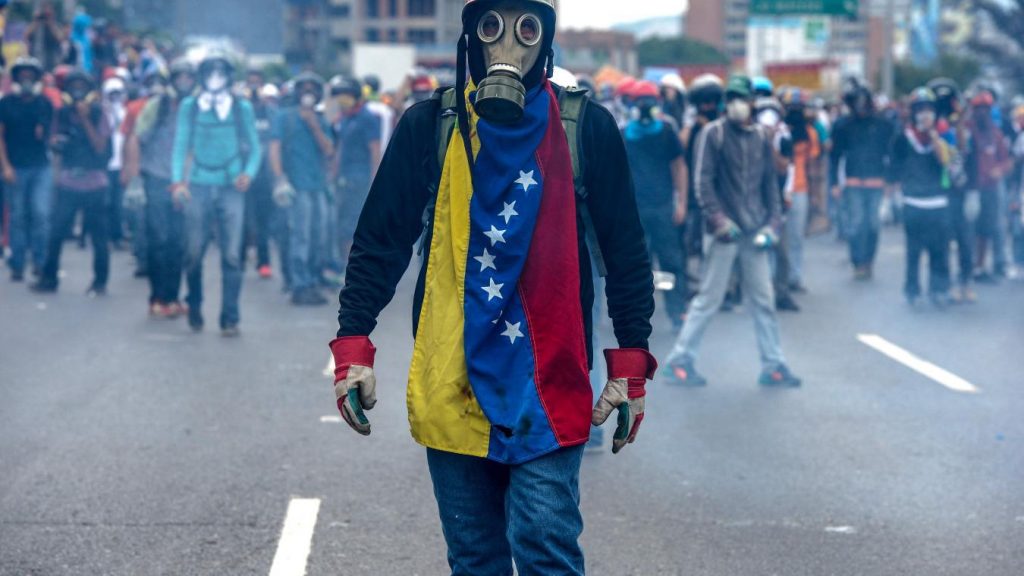The U.S. moved closer to military intervention in Venezuela over the weekend as the U.S.-backed Venezuelan opposition clashed with President Nicolás Maduro’s forces in the sweltering city of Cúcuta on the Colombian border.
The U.S and Venezuelan opposition dispatched convoys of trucks filled with humanitarian aid to numerous border crossings in Cúcuta on Saturday, but pro-Maduro forces blocked the trucks — and the thousands of volunteers escorting them — from entering Venezuela. The showdown brought some of the most violent exchanges yet between Maduro’s forces and his foes: Anti-Maduro protesters threw rocks and Molotov cocktails; Maduro’s forces responded with tear gas and rubber bullets.
As a humanitarian mission, the U.S. aid effort was a failure. No U.S. aid made it into Venezuela, a country that more than 3 million people — most of them economic refugees — have fled in recent years. Hundreds of people on the Colombian side of the border were injured. And even if the supplies the U.S. sent had made it to Venezuela, they wouldn’t have solved the country’s problems — there was only enough to feed about 25,000 people for one week.
But the U.S. and opposition effort may have succeeded in its other mission: giving the U.S. an excuse for military intervention in Venezuela.
Under the Inter-American Treaty of Reciprocal Assistance (commonly known as the Rio Treaty), which the U.S. and Colombia both signed, an attack against one nation is to be considered an attack against them all.
Invoking the treaty would give the U.S. an elegant way to intervene in Venezuela without a declaration of war, allowing the Trump administration to circumvent a Congress that’s not eager for another unending war abroad. That’s exactly what some U.S. lawmakers, such as Sen. Marco Rubio (R-Fla.), a top advocate of intervention, were preparing for this week.
“Maduro Regime has fired into territory of Colombia,” Rubio tweeted Saturday. “Receiving reports of injuries after this attack on sovereign Colombian territory. The United States WILL help Colombia confront any aggression against them.”
Framing the Venezuelan response as an attack on Colombia’s sovereignty, which Rubio does here, sets the stage for the possibility of sending the military to “defend Colombia” — all while circumnavigating the need for a war declaration.

The U.S. has a long history of using humanitarian aid in Latin America to hide other motives for intervention. In the 1980s, the Reagan administration supplied arms to the right-wing Contra rebel group in Nicaragua under the guise of “humanitarian aid”; In 2014, documents obtained by The Associated Press revealed that USAID health clinics in Cuba had been secretly recruiting anti-Castro opposition to spark unrest and overthrow the Castro regime.
This time around, the plan for humanitarian aid came after weeks of threats that the Trump administration wants to send troops to Venezuela to oust Maduro. President Donald Trump has repeatedly declared that “all options are on the table” in Venezuela ever since the conflict elevated on Jan. 23, when opposition leader Juan Guaidó invoked a clause in the country’s constitution to declare himself interim president. The Trump administration recognized him immediately.
In late January, U.S. national security adviser John Bolton “accidentally” flashed a notepad that included the handwritten line: “5,000 troops to Colombia.”
The European Union and some members of Congress have urged against U.S. military intervention in Venezuela. “U.S. military intervention is not an option,” Rep. Eliot Engel (D-N.Y.), the chairman of the House Foreign Affairs Committee, said last week.
That’s when the U.S. and the Venezuelan opposition devised a plan to use humanitarian assistance to put pressure on the Maduro regime and provide an impetus for a potential U.S. invasion.
Sending the aid was a test for Maduro, Trump said, warning that the Venezuelan leader would face peril if he blocked the shipment.
“If you choose this path, you will find no safe harbor, no easy exit, and no way out,” Trump said in a speech last week. “You will lose everything.”
Maduro wasn’t cowed. His forces set up a blockade on the Venezuelan side of the border to prevent the aid from entering. He railed against the “imperialist plot” to destabilize Venezuela and called the aid a “U.S. orchestrated coup attempt” against his government.
On Saturday, thousands of volunteers gathered in Colombia hoping to help get the aid across — and potentially bring down Maduro.
“We are fighting for freedom, without tiring, because we are filled with hope,” Deputy Renzo Prieto, 31, told HuffPost. Prieto is a member of the opposition-controlled National Assembly and was a political prisoner from 2015 to 2018.
Though the exercise was ostensibly about bringing aid into Venezuela, most of the volunteers on hand said the aid was just a front. In fact, no medicine was part of the aid convoy.

